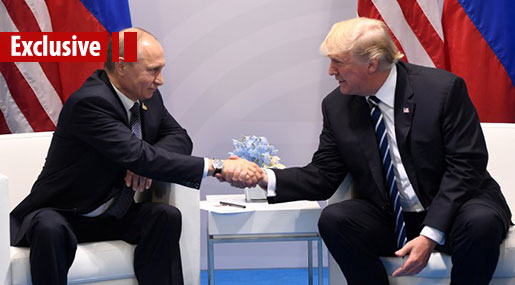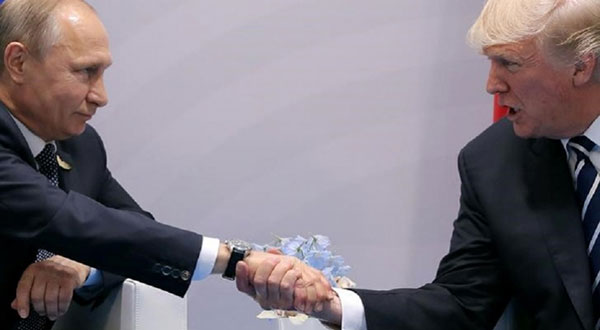
The First Face-to-Face Between Putin & Trump

Darko Lazar
Last week's G20 summit was overshadowed by a meeting between the leaders of the world's two most powerful states.

Observers concluded that the encounter between Vladimir Putin and Donald Trump had "chemistry", which is to say that it was cordial.
The fact that the meeting lasted nearly two and a half hours - four times the slot originally allotted - is an indication of how much the two presidents had to discuss.
As far as Trump is concerned, even talking to Putin - let alone reaching agreements with him - was no easy task, given the unprecedented pressures being exerted upon the White House by the global elites.
As such, his main objective was to get the American public accustomed to images of Russian and U.S. leaders sitting together and holding discussions. This is not a bad idea at all, since the two superpowers have more than just a couple of reasons to establish robust bilateral exchanges.
To say that Trump's task is monumental would be an understatement. The last official summit involving only the heads of state from the two countries took place nearly a decade ago.
To put this into context, one should look no further than the total of 20 meetings between the Chinese and Russian presidents over the last four years alone.
Historical parallels
Interestingly, the long-awaited encounter between Putin and Trump took place in the German city of Hamburg, which happens to sit on the Elbe river.
The chosen venue led some to draw comparisons between the occasion and ‘Elbe Day', a historic meeting of American and Soviet troops on April 25, 1945 - the first such encounter between the two armies during World War II.
Images of soldiers from the two nations, linking up during the final days of the war, marked a symbolic end to Hitler's Third Reich. But even more importantly, it signaled the birth of a new global order, and the creation of two mutually-accepted spheres of influence on the European continent.
Just like the encounter between their compatriots over 70 years ago, the Putin and Trump rendezvous had its share of firm handshakes and eye contact. But the atmosphere was never going to be as friendly, because the two presidents are meeting at a time when the Kremlin stands accused of ‘hacking' the 2016 U.S. election.
The narrative driven by the American mainstream argues that the Kremlin's alleged interference led to Hillary Clinton's defeat, handing Trump the keys to the Oval Office.
Given the information available, it is impossible to say what exactly happened, even with the slightest degree of certainty. However, if Putin really managed to compromise the American electoral system without a ‘colored revolution' or the threat of military force, using only a couple of ‘hackers', then the American democracy would appear to be far more feeble than is generally projected.
The cold breeze from the Euro-Atlantic bloc
It is still too early to say whether the Trump-Putin meeting on the Elbe will some day go down in history as the ‘two hours that changed the world', or whether the encounter will be forgotten like so many of those that the Russian leader had with the previous U.S. president, Barack Obama.
However, some conclusions can still be drawn from those two hours in Hamburg.
For starters, Trump received the most reassuring words and the biggest degree of support from Putin - and not Washington's so-called NATO allies.
In sharp contrast, European leaders have thus far failed to find any common ground with Trump.
By the time the G20 wrapped up, a confrontation between the two western centers of power - Washington and Brussels - looked more likely than one between Moscow and either of those two.
That would certainly explain Trump being promptly invited to attend Bastille Day celebrations in Paris for some urgent damage control.
One thing is clear: the presidents of Russia and the U.S. found a common language, and established the foundation for dialogue.
According to the U.S. Secretary of State, Rex Tillerson, "both presidents were driven by their national interests".
This raises an obvious question - is it in the national interest of the U.S. to carry on with an expensive global confrontation with Russia, or is it time for Washington to focus on its crippling internal problems?
The obvious solution is an agreement on the coordinates for a multipolar world, with the superpowers acting more responsibly and working actively toward the goal of guaranteeing global stability.
The first steps towards defining respective spheres of influence
Aside form bilateral relations, the two leaders focused on three main topics of discussion: a ceasefire in southwestern Syria, the conflict in Ukraine, and tensions on the Korean Peninsula.
The agreement to suspend hostilities in parts of Syria may very well be the equivalent of applying a temporary Band-Aid on a major flesh wound, but it certainly marks a step back from the brink. After all, Syria is the one place where the U.S. and Russia are at constant risk of a direct military confrontation.
One of Putin's main long-term objectives and that of his allies is the preservation of Syria's territorial integrity and preventing the Balkanization of that country.
According to Russian experts, the Kremlin is offering the Trump White House a model where commanders of certain armed groups - not involved in widespread terrorist atrocities - can be integrated into the political process, and where the future of the Damascus government is decided solely at the ballot box.
Of course, any agreement must also guarantee the status of Russian military bases in Syria.
Until now, Washington has rejected all of these demands, deepening the regional conflict and leading to fears of a direct clash between the superpowers.
But the first Trump-Putin meeting in Hamburg has left some room for hope.
This led observers to wonder whether the two leaders had taken the first step toward agreeing on their respective spheres of influence, as well as the process of reshaping of the global order, while the remaining G18 states await the final verdict.
Greek philosopher Heraclitus once said, "you cannot step into the same river twice".
Will Elbe become the river where the superpowers, in defiance of Heraclitus, met for the second time to change the world?
Al-Ahed News



